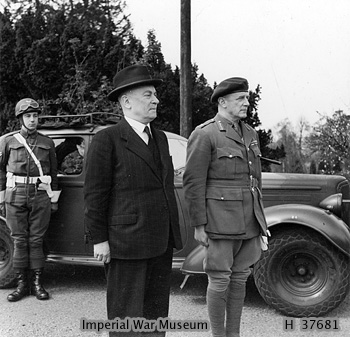<Back to Index>
- Immunologist Niels Kaj Jerne, 1911
- Illustrator Pierre Brissaud, 1885
- Prime Minister of Belgium Hubert Marie Eugène, Comte Pierlot, 1883
PAGE SPONSOR


Hubert Marie Eugène, Count Pierlot (23 December 1883, Cugnon (Bertrix) - 13 December 1963, Uccle) was a Belgian Walloon politician and jurist, the 32nd Prime Minister of Belgium between 1939 and 1945 (a mandate coinciding with World War II and Nazi Germany's occupation of the country).
He was a representative of the Catholic Party (which took various names during his lifetime) in the Chamber of Deputies in 1925 (for Neufchâteau), then to the Senate for Luxembourg Province (between 1926 and 1936) and Arlon (from 1936 to 1946). He also served as Minister of Internal Affairs (1934 - 1935), Minister of Agriculture (1934 - 1935; 1936 - 1939), and Minister of Foreign Affairs (1939). He first led a coalition of Catholics and Socialists, and then one of Catholics and Liberals.
When the Phony War broke, Pierlot became the leader of a national government (or rather a tripartite one), which stayed in power until the German invasion in 1940. During the invasion he and his government came into serious conflict with the Belgian King Leopold III. A few hours after Belgium capitulated on 27 May, he and Paul - Henri Spaak met with the leaders of France - Paul Reynaud, Maxime Weygand, and Philippe Pétain. The meeting was conflictual, as both Belgian leaders attempted to explain their country's position in front of French hostility.
Pierlot later left for London, where he led the government in exile for the rest of the conflict. He gave full backing to the Free French Forces, recognizing Charles de Gaulle as the true leader of France in 1941. His government also directed the formation of the Free Belgian Forces, a force that grew to over 100,000 men under arms by VE Day. Upon his return to Belgium, he led another large coalition, which also included members of the Communist Party of Belgium. Later in 1945, Pierlot was appointed Minister of State.
"Serious to the point of severity, honest to the point of scrupulosity,
a never - tired worker, a devout Christian, a patriot, a model of civic,
professional, and family virtues, he was an exceptional man." (Spaak on Pierlot; P.-H. Spaak, Combats inachevés, Fayard 1969, vol. I)
